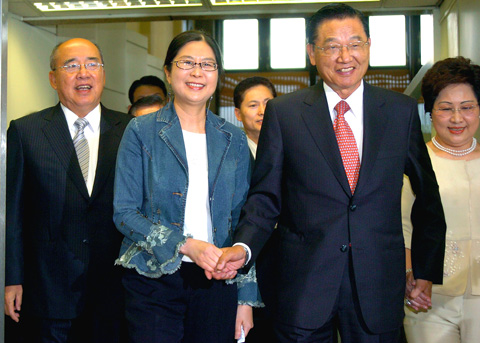Mainland Affairs Council Chairwoman Lai Shin-yuan (賴幸媛) yesterday hailed the conclusion of cross-strait talks on Friday as a new page in Taipei and Beijing relations when greeting the returning delegation headed by Straits Exchange Foundation (SEF) Chairman Chiang Pin-kung (江丙坤) at Taiwan Taoyuan International Airport.<>
“Chiang met the public’s expectations and successfully accomplished his tasks, opening a new page in positive cross-strait exchanges,” Lai said.
During Chiang’s four-day visit to China, he signed accords with his Chinese counterpart Chen Yunlin (陳雲林), chairman of China’s Association for Relations Across the Taiwan Strait (ARATS), to launch weekend cross-strait flights and allow more Chinese tourists to visit Taiwan.

PHOTO: CHU PEI-HSIUNG, TAIPEI TIMES
Chiang yesterday said he did not reach a consensus with Chen on setting up branch offices of their respective organizations in Taipei and in Beijing, as had been reported in the local media.
“Chen suggested setting up a semi-official travel agency in Taipei to help streamline the process of obtaining visas to China. I replied that I would take his suggestion back to Taipei. That’s all I said,” Chiang said.
Later yesterday, President Ma Ying-jeou (馬英九) received Chiang at the Presidential Office. Ma urged Chiang to organize a new round of cross-strait negotiations to reach a deal on the new cross-strait flight routes.
Taipei and Beijing agreed that weekend charter flights must fly through Hong Kong airspace instead of taking a direct route across the strait, but during the talks, Chiang suggested allowing the charter flights to fly a “direct route.”
Chiang’s move sparked controversy as to whether he was authorized to make the proposal as the Ministry of National Defense had expressed its opposition for national security reasons.
Ma yesterday said he backed the “direct flight” proposal.
“The shorter the flying time [between Taiwan and China], the more everyone will benefit,” Ma said.
“Direct flight, new flight routes, cargo charter flights and weekday passenger charter flights should all be put on the table as soon as possible,” he said.
Both sides of the Taiwan Strait agreed to establish “institutionalized” communication channels following the Chiang-Chen talks, Ma said.
“Different issues can be talked about by different groups at the same time and the talks can take place in Taiwan and in China simultaneously,” Ma said. “That way, it would be faster. There are a thousand of things that remain to be done. My worry is that progress will fall behind the public’s expectations.”

‘DENIAL DEFENSE’: The US would increase its military presence with uncrewed ships, and submarines, while boosting defense in the Indo-Pacific, a Pete Hegseth memo said The US is reorienting its military strategy to focus primarily on deterring a potential Chinese invasion of Taiwan, a memo signed by US Secretary of Defense Pete Hegseth showed. The memo also called on Taiwan to increase its defense spending. The document, known as the “Interim National Defense Strategic Guidance,” was distributed this month and detailed the national defense plans of US President Donald Trump’s administration, an article in the Washington Post said on Saturday. It outlines how the US can prepare for a potential war with China and defend itself from threats in the “near abroad,” including Greenland and the Panama

The Chinese Nationalist Party (KMT) is maintaining close ties with Beijing, the Democratic Progressive Party (DPP) said yesterday, hours after a new round of Chinese military drills in the Taiwan Strait began. Political parties in a democracy have a responsibility to be loyal to the nation and defend its sovereignty, DPP spokesman Justin Wu (吳崢) told a news conference in Taipei. His comments came hours after Beijing announced via Chinese state media that the Chinese People’s Liberation Army’s Eastern Theater Command was holding large-scale drills simulating a multi-pronged attack on Taiwan. Contrary to the KMT’s claims that it is staunchly anti-communist, KMT Deputy

RESPONSE: The government would investigate incidents of Taiwanese entertainers in China promoting CCP propaganda online in contravention of the law, the source said Taiwanese entertainers living in China who are found to have contravened cross-strait regulations or collaborated with the Chinese Communist Party (CCP) could be subject to fines, a source said on Sunday. Several Taiwanese entertainers have posted on the social media platform Sina Weibo saying that Taiwan “must be returned” to China, and sharing news articles from Chinese state media. In response, the Mainland Affairs Council (MAC) has asked the Ministry of Culture to investigate whether the entertainers had contravened any laws, and asked for them to be questioned upon their return to Taiwan, an official familiar with the matter said. To curb repeated

Myanmar has turned down an offer of assistance from Taiwanese search-and-rescue teams after a magnitude 7.7 earthquake struck the nation on Friday last week, saying other international aid is sufficient, the National Fire Agency said yesterday. More than 1,700 have been killed and 3,400 injured in the quake that struck near the central Myanmar city of Mandalay early on Friday afternoon, followed minutes later by a magnitude 6.7 aftershock. Worldwide, 13 international search-and-rescue teams have been deployed, with another 13 teams mobilizing, the agency said. Taiwan’s search-and-rescue teams were on standby, but have since been told to stand down, as